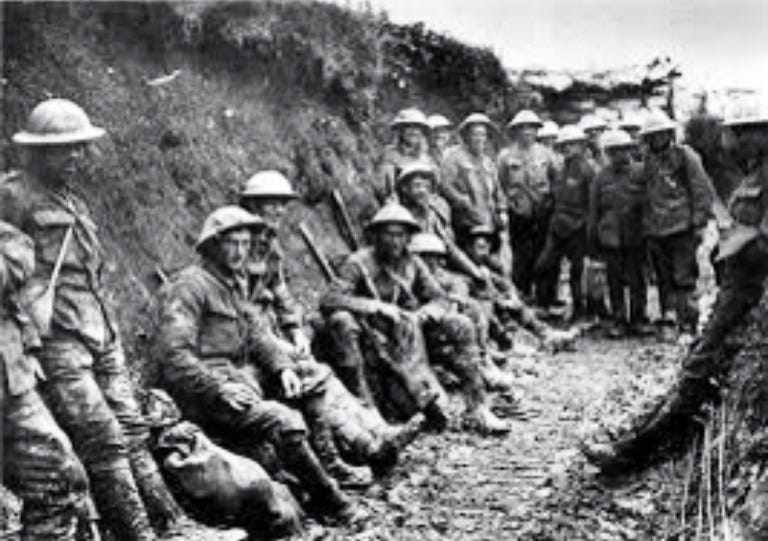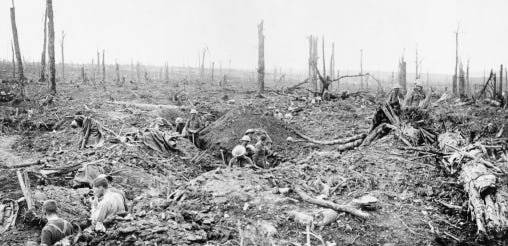Perhaps Next Christmas the War Will Be Over
The arrival of the yuletide season of peace always contrasts sharply with the ongoing reality of war. This year, as we exchange our holiday greetings, immense suffering continues in various places around the globe.
The contrast was particularly stark during World War I. In December 1914, the war had settled into a stalemate. The two sides faced each other from trench lines that split Europe from the English Channel to Switzerland.
With the arrival of Christmas five months after the war began, the news leaked out that some of the soldiers had spontaneously declared a pause in the fighting. They had acted in spite of orders that barred fraternizing with the enemy. On their own, they enacted the Christmas Truce of 1914.
The event seemed so improbable that it was often said to be a fanciful legend. But it was well documented in soldiers’ letters and diaries. It proved remarkably widespread, involving, by some estimates, more than a hundred thousand combatants.
It started with men lighting candles on the edge of the trenches or on improvised Christmas trees. The muddy ditches were close enough that opposing soldiers could yell over to their counterparts on the far side of no-man’s land. Soon they began to serenade each other with German and English Christmas carols.
Then, tentatively, a few soldiers appeared above the battlements and walked, unarmed, toward their enemies. They shook hands, exchanged small gifts — wine and brandy for German beer, pumpernickel and ham for tobacco and souvenirs.
The truce became a symbol of reconciliation, a glimmer of humanity against the darkness of war. Some of the soldiers remained “good friends” with their opponents after the accord lapsed. They had more in common with their suffering fellow soldiers than with civilians on the home front.
Participants expressed wonder at the event. “Yesterday,” a young member of the London Rifle Brigade wrote to his mother, “the British & Germans met & shook hands in the Ground between the trenches. Marvellous, isn't it?”
An officer remembered that men from both sides joined in singing “‘Auld Lang Syne.” He wrote, “It was absolutely astounding.” One British soldier noted, “Looking back on it all, I wouldn't have missed that unique and weird Christmas Day for anything.”
A member of the Scottish Black Watch regiment remarked on the silence. “All I'd heard for two months in the trenches was the hissing, cracking and whining of bullets in flight, machine gun fire and distant German voices. But there was a dead silence that morning. We shouted, ‘Merry Christmas!’”
Men even played football on whatever level ground they could find between the lines. “Eventually the English brought a soccer ball from their trenches,” a German soldier recorded in his diary, “and pretty soon a lively game ensued. How marvelously wonderful, yet how strange it was.”
Ranking officers viewed the truce differently. The commander of French 10th Army remarked on the “unfortunate consequences” when soldiers “become familiar with their neighbors opposite.” A private noted that a British brigadier general “came round the trenches and told every fellow to shoot any German he saw . . . no one took any notice of this order and carried on as usual.”
A corporal in the 16th Bavarian Reserve Infantry complained of the truce to his fellows, “Such a thing should not happen in wartime. Have you no German sense of honor left?” His name was Adolf Hitler.
As Christmas 1915 neared, opposition by the brass to any kind of truce grew. It had been a year of battles that had accomplished little more than to add names to war memorials. Yet some British officers encouraged units to mount raids and to harass the opposing line. They ordered Christmas artillery barrages. German commanders forbade fraternizing. “Every approach to the enemy,” they announced, “will be punished as treason.”
But holiday truces happened even that year. One English infantryman remembered being called to by enemy soldiers “with encouraging shouts that we could neither understand nor misunderstand. A drunken German stumbled over his parapet and advanced through the barbed wire, followed by several others, and in a few moments there was a rush of men from both sides, carrying tins of meat, biscuits and other odd commodities.”
The poignant stories of the Christmas truce remind us of another refrain heard during wartime. It expresses the sincere but often vain hope that the fighting will be over and the troops will be back home “before Christmas.”
Yet wars are always easier to begin than to end. As the Great War continued, Christmas 1916 saw no pause in the fighting. That year, a German officer sent a letter home. “My Dear Mother,” he wrote. “Perhaps next Christmas the war will be over and I shall be back with you all again. How we long for that time when we shall be able to look back on these days and regard them as a dream . . .”
Have a merry and a peaceful Christmas and spare a thought for those who can’t make it home.








Morning Jack. Another good article from Talking to America. I pray that there will be no more war and peace can be an everyday thing, not just once a year. Happy Holidays and be well.
Peace is the carrot at the end of the stick, war is the means to achieve it. Works great. Not!